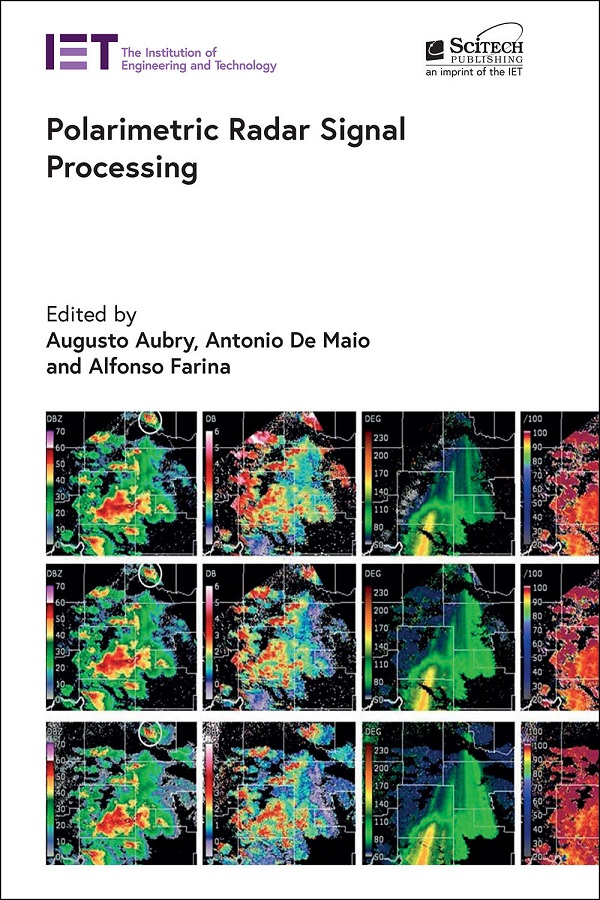- Agricultural Engineering and Technology
- Applied Physics
- Built Environment
- Computing and Networks
- Control, Robotics and Sensors
- Electrical Regulations
- Electromagnetics and Radar
- Energy Engineering
- Healthcare Technologies
- History and Management of Technology
- IET Codes and Guidance
- Manufacturing
- Materials, Circuits and Devices
- Model Forms
- Security
- Telecommunications
- Transportation

Polarimetric Radar Signal Processing
Edited by Augusto Aubry, Antonio De Maio, Alfonso Farina
Polarimetric Radar Signal Processing provides an overview of advanced techniques and technologies developed for polarimetric radars to meet challenging performance requirements. It aims to cover some of the most challenging application fields, including: target detection for active and passive surveillance systems, interference suppression, detection of temporal changes in a given scene, environment classification, automatic target recognition, non-cooperative target imaging, polarimetric coding in radar and SAR systems, pol-SAR ambiguities suppression, space-debris detection, tracking, and classification, estimation of biological and behavioural parameters of insects, precipitations localization as well as type and motion parameters estimation via real-life practical polarimetric weather radar.
The book balances a practical point of view with a rigorous mathematical approach corroborated with a wealth of numerical case studies and real experiments. Additionally, the book has a cross-disciplinary approach as it aims to exploit cross-fertilization by the recent and latest research and discoveries in statistical signal processing theory and electromagnetism.
Each chapter is self-contained and is written by renowned researchers in polarimetric radar signal processing. The emphasis of the book is on both theoretical results and practical applications that clearly show the potential benefits in radar performance using polarimetric diversity in different application domains. Cross referencing and a common notation have been realized so that the related material as well as equations can be easily connected. This significantly enhances the book's value as a reference.
This book is addressed to systems engineers and their managers in civilian as well as defence companies; technical staff in procurement agencies and their technical advisers; students at MSc and PhD levels in signal processing, electrical engineering, systems and defence engineering; and any persons interested in applications of polarimetry theory to radar engineering.
About the Editors
Augusto Aubry is an associate professor at the University of Naples Federico II, Italy. His research interests include statistical signal processing and optimization theory, with emphasis on topics related to MIMO communications and radar signal processing. Professor Aubry received the 2022 IEEE Fred Nathanson Memorial Award and is co-recipient of the 2018 IEEE AESS Barry Carlton Best Paper Award. He is an associate editor of the IEEE Transactions on Signal Processing and is an IEEE senior member.
Antonio De Maio is a full professor at the University of Naples Federico II, Italy. Professor De Maio received the 2010 IEEE Fred Nathanson Memorial Award. Dr De Maio is a fellow of the IEEE and co-recipient of the 2018 IEEE AESS Barry Carlton Best Paper Award. His research interest is in the field of statistical signal processing, with emphasis on radar detection, optimization theory applied to radar signal processing, and multiple-access communications.
Alfonso Farina is most noted for the development of track while scan techniques for radars and for the development of numerous signal processing techniques used for sensors where tracking plays an essential role. He is author of about 1000 publications. He has won the Fred Nathanson Memorial Radar Award (1987), the IEEE Dennis J. Picard Medal for Radar Technologies and Applications (2010), the IET Achievement Medal (2014) and the IEEE AESS Pioneer Award (2020).
Publication Year: 2022
Pages: 525
ISBN-13: 978-1-83953-402-7
Format: HBK
